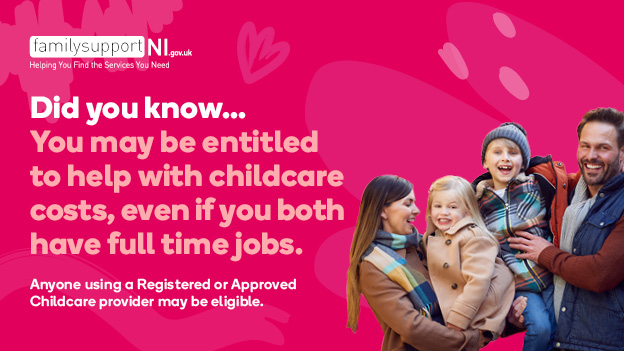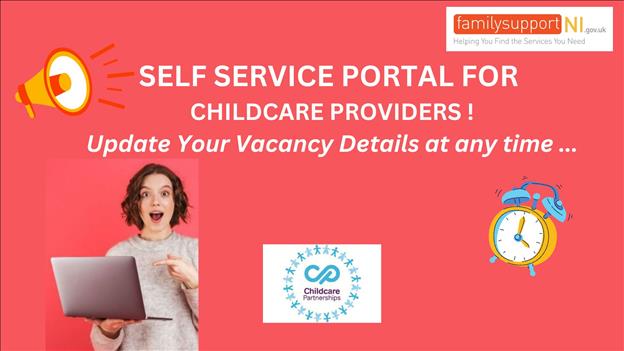Help with Childcare Costs - Financial Support for Working Parents

Registered childcare is vital in supporting children and enabling parents to get into and stay in work, but the cost can be a significant expense for families. Most working families are entitled to some form of support with their childcare costs, including those on higher incomes. So whatever your circumstances, find out more about the financial help that may be available to you if you are using Registered or Approved Childcare.
Many working families struggle to afford the childcare they need, yet are unaware that financial support may be available.
It is important to make sure you are receiving all the financial support you are entitled to.
Can I get help towards my Childcare Costs?
FSNI have produced a useful video outlining Financial Assistance with Childcare Costs and helpful information about how to access this :-
Most working families in Northern Ireland will be entitled to financial support with their registered childcare costs, although there are some exceptions.
You can only receive help with childcare costs that are being paid to a registered or approved childcare provider.
There are different types of help towards these childcare costs, with support available to working parents through the benefits system, Government support schemes or tax relief. The best form of help will be determined by your circumstances, such as whether you are working or self-employed, in a couple or single, and how much your childcare costs are.
There are different criteria in place that you must meet to be eligible to apply for the different forms of help towards your childcare costs.
You should read the criteria for each scheme or benefit carefully, as they may be different, but the most common criteria to qualify may specify:
- working a minimum number of hours
- children not to be over a certain age
- household income not to exceed a certain amount
- childcare provider must be registered or approved
You may not be entitled to help towards your childcare costs if you are already accessing support, and:
- you have ‘not recourse to public funds’ or
- you or your partner earn more than £100,000 per annum
What help is available?
The main forms of support with the cost of childcare are outlined below. The amount of financial support you may be entitled to receive on each of those schemes will depend on your circumstances and it can be complicated working out what is best for you. It is therefore important to contact a Family Benefits Advisor, who will help you work out the most beneficial source of support for your family.
- Employers For Childcare Family Benefits Advice Service (at employersforchildcare.org) provides free, confidential and impartial advice setting out your best options for support, and what is the best choice for your family depending on your specific circumstances. The Advisors are available by phone on 028 9267 8200 Monday to Friday 9am to 5pm, or by emailing hello@employersforchildcare.org . Last year, the team identified an average of £2,800 in financial support for parents who asked for a personal ‘better off’ calculation and over the last five years has helped families to access £54.5 million in financial support.
- HMRC Childcare Choices (at gov.uk) is the government website that shows the different types of help there is available towards your childcare costs (not all available in Northern Ireland).
- Financial help if you have children (at gov.uk) is a list of all the different benefits you may be able to claim depending on your circumstances
- Childcare Costs Calculator (at gov.uk)is an online calculator which will work out how much money you could get towards registered or approved childcare
The Main Forms of Support with the Cost of Childcare:
You can find more information on the main forms of support with the cost of childcare below:
Tax Free Childcare
Parents and carers could be eligible for Tax-Free Childcare if they:
- have a child or children aged up to 11. They stop being eligible on 1 September after their 11th birthday. If their child is disabled, they may get up to £4,000 a year until 1 September after their 16th birthday
- earn, or expect to earn, at least the National Minimum Wage or Living Wage for 16 hours a week, on average
- each earn no more than £100,000 per annum
- do not receive tax credits,Universal Credit or childcare vouchers
Tax-Free Childcare is available to both employees and the self-employed.
HMRC has produced an eligibility checker about the scheme
HMRC eligibity checker (at childcarechoices.gov.uk)
Each eligible child requires their own Tax-Free Childcare account. If families have more than one eligible child, they will need to register an account for each child. The UK Government top-up is then applied to deposits made for each child, not household.
Account holders must confirm their details are up to date every 3 months to continue receiving the government top-up.
Childcare providers can also sign up for a childcare provider account via GOV.UK to receive payments from parents and carers via the scheme. Childcare provider account via GOV.UK (at gov.uk).
The Northern Ireland Childcare Subsidy Scheme (NICSS)
The Northern Ireland Childcare Subsidy Scheme (NICSS) provides a 15% subsidy on childcare costs to support working parents with children costs.
It is delivered by registered childcare providers participating in the Tax-Free Childcare (TFC) scheme, including daycares, playgroups, childminders, and Approved Home Childcares.
To be eligible
1) Parents must be registered for Tax Free Childcare (TFC)
and
2) Their childcare provider must be signed up with HRMC as a TFC Provider.
Early Years - the organisation for young children, has been appointed to administer the scheme on behalf of the Department of Education.
Details on the scheme including guidance to support Childcare Providers' registration is available on the Early Years website
Northern Ireland Childcare Support Scheme (NICSS) (at FamilySupportNI.gov.uk)
Childcare Vouchers
Childcare Vouchers are a scheme run through an employer’s payroll aimed at helping working parents with the cost of childcare. Parents ‘sacrifice’ part of their salary into the Childcare Voucher account and, as a result, save on their tax and National Insurance.
Childcare Vouchers are accepted by childcare providers across Northern Ireland and can be used to pay for all types of childcare as long as it is approved or registered.
This scheme was closed to new entrants on 4th October 2018, however, those that had already signed up prior to that date can continue to use it.
Parents who had joined the scheme before it closed, remain eligible provided they:
- make at least one salary sacrifice into their Childcare Voucher account within each 52 week period
- do not leave the scheme in order to use Tax-Free Childcare, and
- do not change employer
Working Tax Credit
Working Tax Credit is money provided to boost the income of working people who are on a low income and for eligible claimants can include an element towards your registered childcare costs. For new claimants this has now been replaced by Universal Credit
Universal Credit
Universal Credit is a single monthly payment for people in or out of work, which merges together some of the old benefits and tax credits. Universal Credit has replaced income- based Job Seeker's Allowance, Income-related Employment Support Allowance, Income Support, Housing Benefit, Child Tax Credit and Working Tax Credit. If you are working, your Universal Credit payment can include an amount to help with the cost of childcare, equivalent to 85% of your registered childcare costs. However Universal Credit is a means tested benefit, so therefore the amount you receive each month will depend on various factors such as your income and any savings you may have, your outgoings on childcare and rent, the number of children you have an if there are any disabilities in the household.
Universal Credit Claimants :- Financial Assistance for Out of Schools Provision (at familysupportni.gov.uk)
Applying for a Pre-school Place
To apply for a pre-school education place, go to : Applying for a Pre-school Place (at eani.org.uk )
Benefits for children with disabilities or additional needs
Please see useful information from Employers For Childcare about Benefits for children with disabilities or additional needs Employers For Childcare Benefits for Children with Disabilities or Additional Needs (at employersforchildcare.org)
Registered and Approved Childcare
If you are entitled to help with your childcare costs, you must be using a Registered or Approved Childcare Provider. Registered childcare providers include :-
- childminders
- day nurseries
- after school clubs
- play schemes
- holiday clubs
- summer camps
- school holiday activities
- nannies or approved home childcarers
Family Support NI is the public childcare register, which lists all Childcare Providers that are Registered or Approved with Health & Social Services within Northern Ireland.
Childcare Providers - Have you activated your Tax-Free Childcare Account ?
If you are a childcare provider or childminder, you can boost your business and help reduce cost for working families by activating your Tax-Free Childcare Account to make sure families can access government support when using your services.
Information For Childcare Providers (at childcarechoices.gov.uk)
If you are already registered and haven’t received your invitation letter, you should contact the Childcare Service Helpline : 0300 123 4097
HMRC email updates, videos and webinars if you’re self-employed (at gov.uk)
Employers Guide to Childcare (Labour Relations Agency)
NI Business Info - Employers Guide to Childcare
Employers guide to childcare (nibusinessinfo.co.uk)





.png)
.png)
.png)

.png)



.png)

.png)
.png)




.jpg)